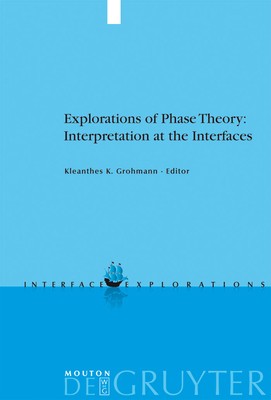
- We will send in 10–14 business days.
- Publisher: Walter de Gruyter
- Year: 2009
- Pages: 282
- ISBN-10: 3110205211
- ISBN-13: 9783110205213
- Format: 16.3 x 23.4 x 2.3 cm, hardcover
- Language: English
- SAVE -10% with code: EXTRA
Explorations of Phase Theory: Interpretation at the Interfaces (e-book) (used book) | bookbook.eu
Reviews
Description
Over the past decade, many issues leading towards refining the model have been identified for a theory of syntax under minimalist assumptions. One of the central questions within the current theoretical model, Phase Theory, is architectural in nature: Assuming a minimal structure of the grammar, how does the computational system manipulate the grammar to construct a well-formed derivation that takes items from the mental lexicon to the interpretive interfaces? This collection addresses this issue by exploring the design of the grammar and the tools of the theory in order to shed light on the nature of the interpretive interfaces, Logical Form and Phonetic Form, and their role in the syntactic computation.
The chapters in this volume collectively contribute to a better understanding of the mapping from syntax to PF on the one hand, especially issues concerning prosody and Spell-Out, and semantic interpretation at LF on the other, including interpretive and architectural issues of more conceptual nature. Apart from careful case studies and specific data analysis for a number of languages, the material contained here also has repercussions for Phase Theory in general, theoretical underpinnings as well as modifications of syntactic mechanisms.
EXTRA 10 % discount with code: EXTRA
The promotion ends in 9d.13:23:45
The discount code is valid when purchasing from 10 €. Discounts do not stack.
- Publisher: Walter de Gruyter
- Year: 2009
- Pages: 282
- ISBN-10: 3110205211
- ISBN-13: 9783110205213
- Format: 16.3 x 23.4 x 2.3 cm, hardcover
- Language: English English
Over the past decade, many issues leading towards refining the model have been identified for a theory of syntax under minimalist assumptions. One of the central questions within the current theoretical model, Phase Theory, is architectural in nature: Assuming a minimal structure of the grammar, how does the computational system manipulate the grammar to construct a well-formed derivation that takes items from the mental lexicon to the interpretive interfaces? This collection addresses this issue by exploring the design of the grammar and the tools of the theory in order to shed light on the nature of the interpretive interfaces, Logical Form and Phonetic Form, and their role in the syntactic computation.
The chapters in this volume collectively contribute to a better understanding of the mapping from syntax to PF on the one hand, especially issues concerning prosody and Spell-Out, and semantic interpretation at LF on the other, including interpretive and architectural issues of more conceptual nature. Apart from careful case studies and specific data analysis for a number of languages, the material contained here also has repercussions for Phase Theory in general, theoretical underpinnings as well as modifications of syntactic mechanisms.


Reviews